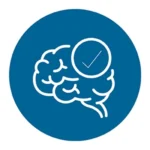A head CT (Computed Tomography) scan is a non-invasive imaging test that uses X-rays and computer technology to create detailed cross-sectional images of the brain, skull, sinuses, and blood vessels. It provides clearer and more precise images than standard X-rays, helping doctors diagnose a wide range of conditions affecting the brain and head.
A head CT scan may be recommended if you experience:
1.) Head trauma or skull fractures
2.) Severe or sudden headaches
3.) Stroke symptoms, such as weakness or speech difficulties
4.) Dizziness, balance issues, or vertigo
5.) Cognitive changes, confusion, or memory loss
6.) Hearing or vision problems linked to brain function
The scan itself takes about 10 to 15 minutes, though your total time at the imaging center may be 30 to 45 minutes to allow for check-in and preparation.
Some CT scans require contrast dye to enhance the visibility of blood vessels, tumors, or brain structures. If contrast is needed, it will be administered through an IV or orally. Your doctor will determine if contrast is necessary based on your symptoms and medical history.
No, a CT scan is a painless, non-invasive study. You’ll lie comfortably on a table while the scanner takes images.
Some insurance plans require a doctor’s referral, while others do not. It is important to check with your doctor and your insurance benefits manager to determine if one is needed before scheduling.
Yes, a CT scan is safe and widely used for diagnosing head and brain conditions. The scan uses low-dose radiation, and precautions are taken to minimize exposure. If you are pregnant or have allergies to contrast dye, inform your doctor before your scan.
You may be asked to avoid eating or drinking for a certain period of time before your scan, especially if contrast is recommended. Wear comfortable clothing and remove any metal objects like jewelry. Our team will review your medical history when you arrive for your appointment to ensure the proper preparation was followed before the study begins.
One of our board-certified, subspecialized radiologists will review your images, and develop a detailed report. The results are typically sent to your referring doctor within 1 – 2 days, and available in our patient portal within 5 – 7 days.
South Jersey Radiology Associates is in-network with 99% of health insurance providers, including Aetna®, AmeriHealth®, Blue Cross Blue Shield®, Cigna®, Humana®, UnitedHealthcare® and many state-sponsored medical plans. Our staff will verify your coverage and discuss any out-of-pocket costs before your appointment.
CT scans are open, not enclosed like an MRI, so most patients feel comfortable. If you have concerns, let us know, and we’ll help ensure a stress-free experience.










